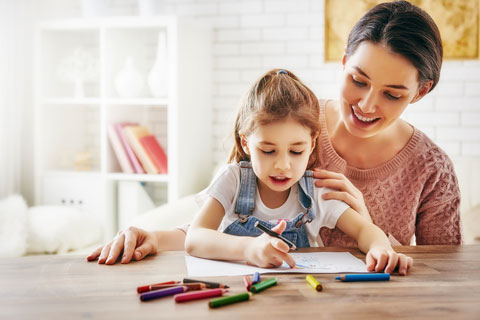In this document, we respond to a variety of questions about parent-child relationships.
Why are strong parent-child relationships important?
All young children benefit from consistent and stable relationships with their parents. These family members form a “secure base.” Through family relationships, children learn to trust that others will be there for them and meet their needs. They learn to depend on routines as a source of stability and predictability. When children know their physical and emotional needs will be met, they are better able to take advantage of opportunities to explore the world around them.
What can family members who care for young children do to build strong relationships with them?
Young children depend upon adults to provide care, comfort, and opportunities to learn and grow. For most young children, their primary caregivers are their parents. For other young children, grandparents, aunts, foster parents, or other adults are their primary caregivers who fill the role of parents. In this Q&A, we include all of these adults when we refer to “parents.”
Strong relationships with young children are built on a foundation of caring, concern, and predictability. Young children learn about their world through their interactions with important adults. When parents are present and ready to respond to their child, they learn that other people are dependable and want to build connections. Here are some simple suggestions for parents:
- Begin by setting up a consistent and sustainable routine so a child’s needs are met on a predictable schedule.
- Get to know your child by watching them play and explore the world. Notice the toys and types of interactions they prefer.
- Talk to your child about the things around them.
- Find things you enjoy doing together, such as reading stories, playing with toys, or taking walks outdoors. The activity does not matter as much as the time you spend being together.
How will a strong parent-child relationship help my young child succeed in child care and school?
The relationships children build with parents are an important foundation for the connections they will make with other individuals in their schools and communities. When parents are working, other caregivers such as teachers, childcare providers, family members, and friends step in to fill that caregiving role. The effect of a strong parent-child relationship can be seen even when children are not by their parent’s side or when they have to say goodbye to them at the start of the school day. Through daily interactions with parents, children learn to trust, take turns, and communicate. Children carry relationship skills and feelings about relationships into their relationships with other adults and children. For example, when a child shares a toy with a parent and receives praise, they learn that it is good to share, and they are encouraged to experience that positive feeling with friends and other adults.
How can I make time to be with my young child when I have such a busy schedule?
Sometimes parents may feel guilty or feel as if they do not have enough time to spend with their young children. In addition to parenting, they may be working, in school, volunteering in their community, and completing housework and errands.
Everyday routines and activities are wonderful times for parents and children to be together, learning side by side. Instead of thinking of ways to distract children while getting things done, parents can involve them in the process. Even times of waiting can afford opportunities for connection and learning! Children can learn and connect with parents as they ride along in the grocery cart and talk about the things in the store, while they help sort a basket of laundry, or when they help with tasks such as spreading jam on toast.
For some parents, it helps to plan routines in which they focus only on their child. For example, parents might put their cell phones away to focus on mealtime or turn off the television, computer, or radio before putting the children to bed so they can focus on reading bedtime stories. Making these small adjustments can help parents find the time for meaningful connections with their young children.
Who can I turn to for support with my parent-child relationship?
There are many people and agencies that can help parents build a strong relationship with their young child. Local school districts, child care resource and referral agencies, or public health departments may offer child development information or parenting classes. Pediatricians’ offices and children’s departments at libraries may also offer resources and information. If families have difficulties, they can contact their school social worker, family counselor, or a therapist.
IEL Resources
- Tip Sheets
Web Resources
-
Find Your Local CCR&R
Source: INCCRRA
Child care resource and referral services are available in all Illinois communities through a local Child Care Resource & Referral (CCR&R) agency. Each CCR&R represents a grouping of counties in the state, referred to as a service delivery area (SDA).
-
Health Regions and Local Health Departments
Source: Illinois Department of Public Health
This web site provides a map of Illinois with corresponding health departments by region.


